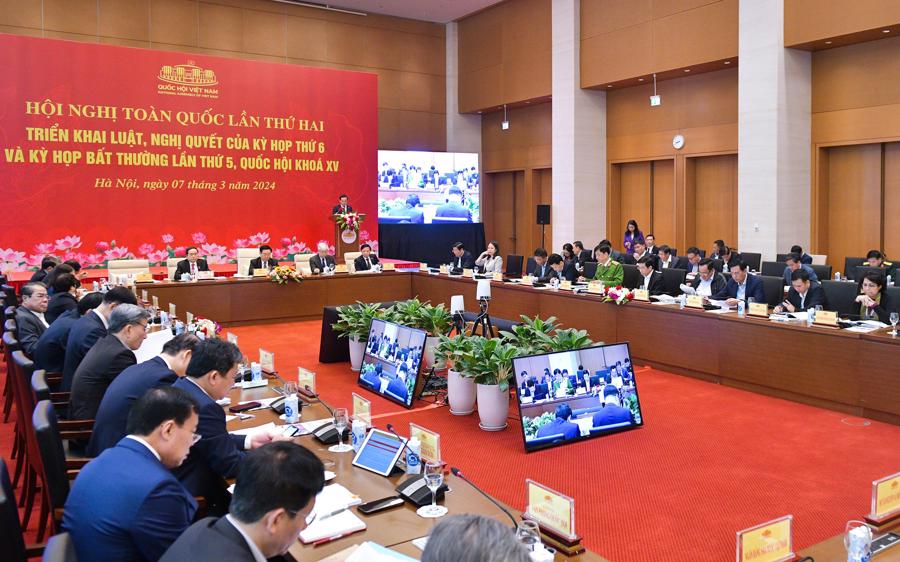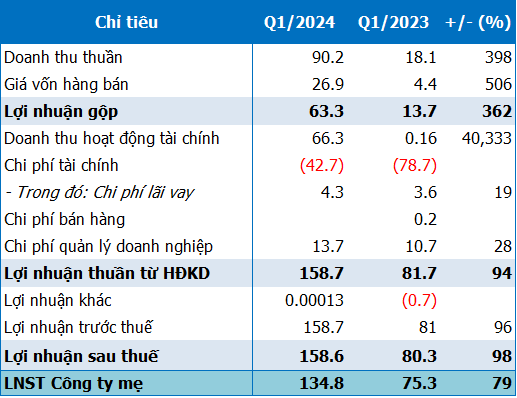At the second national conference on the implementation of laws and resolutions of the 6th session and the 5th extraordinary session of the 15th National Assembly on March 7, the report on the organization and implementation of the enforcement of laws and resolutions was presented by Deputy Prime Minister Tran Luu Quang. He stated that the National Assembly has passed 9 important laws and 11 resolutions related to all aspects of socio-economic life, the rights and interests of organizations, businesses, and citizens. These laws and resolutions aim to recover and develop the economy after the Covid-19 pandemic, as well as address many inconsistent issues in the legal system after the review process, such as the Housing Law, Real Estate Business Law, Telecommunications Law, Land Law, Credit Institutions Law, etc.
FIRM, PROACTIVE, TIMELY IMPLEMENTATION OF LAWS AND RESOLUTIONS INTO LIFE
In 2023, the Government approved 49 proposals for the construction of laws, draft laws, and resolutions, and issued 93 decrees, 01 inter-ministerial resolution. The Prime Minister issued 33 decisions on legal provisions.
To achieve these results, the Government and the Prime Minister have provided strong guidance for close coordination between ministries and agencies in adjusting law projects and draft resolutions to meet the schedule and ensure the quality, with a focus on proposing solutions to difficult and complex issues.
In 2023, in addition to regular sessions, the Government organized 10 specialized sessions on law construction; The Government’s Standing Committee regularly discussed and sought opinions on law projects and draft resolutions; Government leaders strengthened direct work with ministries, sectors, and localities to collect opinions, give directions on major and complex issues, and address different opinions in each law project and draft resolution.

In fact, the Government issued 264 resolutions; the Prime Minister issued 1,742 individual decisions, 32 instructions, 104 official letters, and many documents guiding the implementation of tasks within its jurisdiction.
“In order to timely and effectively implement the laws and resolutions passed by the National Assembly and implement the policy of closely integrating law construction with law enforcement organization, the Government and relevant ministries, agencies, and localities have actively and proactively implemented the laws and resolutions into life,” emphasized the Deputy Prime Minister.
Despite many difficulties and challenges in the implementation process, especially in terms of schedule pressure, scope, workload, and internal difficulties related to the detailed provisions, the Government, the Prime Minister, and the relevant ministries and agencies have resolutely and proactively implemented the enforcement of laws, resolutions, and the construction and issuance of detailed regulations.
Furthermore, the Government and the Prime Minister have directed ministries, sectors, and localities to actively and responsibly carry out the review of the legal system as required in Resolution No. 101/2023/QH15, and submitted Report No. 587/BC-CP on October 20, 2023, to the National Assembly on the results of the review of the legal system.
The Deputy Prime Minister stated that after the end of the sessions of the National Assembly, the ministries and agencies in charge of drafting are currently implementing plans to issue or issue under their authority plans to implement the enforcement of laws and resolutions passed by the National Assembly.
In some localities, specific instructions and plans are being considered for promulgation, guidance, and the development of plans to implement the laws and resolutions, with specific responsibilities assigned to relevant departments and agencies for widespread implementation at the grassroots level.
Furthermore, after the laws and resolutions were passed by the 6th session and the 5th extraordinary session of the National Assembly, dissemination of the laws and resolutions has been carried out.
Most ministries, sectors, and localities have incorporated the new guiding and directing content into the legal education programs in 2024; 27 out of 63 provinces and cities have developed guiding documents and official letters to disseminate the new laws and resolutions. Ministries and inter-ministerial agencies have organized training and compiled materials to disseminate and introduce the laws and resolutions to the people and businesses.
Based on the results of the 6th session and the 5th extraordinary session of the National Assembly, the Prime Minister issued a decision to assign agencies to draft detailed regulations.
DRAFTING AND ISSUING DETAILED REGULATIONS ON SCHEDULE
In order to detail the laws and resolutions passed at the 6th session and the 5th extraordinary session, the Government, the Prime Minister, ministers, and heads of inter-ministerial agencies are tasked with issuing 56 regulations (29 decrees, 05 decisions, 22 circulars) to detail 10 laws and resolutions.
Currently, the ministries in charge of drafting are implementing the tasks in accordance with the Law on Promulgation of Legal Normative Documents, with a high determination to ensure the progress and quality of the documents.
To further improve the quality of the implementation of laws, ordinances, and resolutions of the National Assembly, the National Assembly Standing Committee and the Deputy Prime Minister emphasized that the Government and the Prime Minister will focus on issuing plans to implement the enforcement of laws and resolutions, strengthening the implementation of new legal normative documents, and promoting legal education through various forms suitable for each specific target group.
Special attention will be paid to training and professional training for the staff of specialized units of ministries, departments, and localities entrusted with advising on the implementation of laws and resolutions, especially specialized laws with new and complex content such as the Land Law, Credit Institutions Law, Telecommunications Law, Identification Law, etc.
In addition, it is necessary to organize the drafting and issuance of 56 regulations to detail the laws and resolutions on schedule and with good quality, ensuring that the detailed regulations have the same legal effect as the detailed regulations to be specified, in order to promptly implement the laws and resolutions into life.
During the drafting of the detailed regulations, it is necessary to combine the processing of contradictory, overlapping, and problematic contents.
The Deputy Prime Minister emphasized the need to synchronize measures to improve the effectiveness of the organization of the enforcement of laws and resolutions, tighten discipline, and elevate the responsibility of leaders, as well as strengthen inspection and oversight to timely detect and handle strictly corrupt, negative acts, interests of groups and localities in the enforcement of laws.
In addition, attention should be paid to the rational allocation of financial resources, infrastructure, organizational structure, staff, and other necessary conditions to implement the enforcement of laws and resolutions effectively and efficiently, while ensuring economization.











































